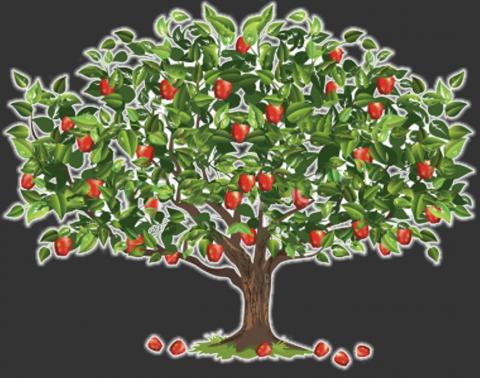
The Apple Tree
Two men see an apple tree One of the men takes two apples. One for now and one for his trip back home. The other man is a hard worker Rather than taking Just two apples, he takes them all. The first man is eager Rather than eating just one apple, He eats them both. Yet he still needs food for his journey Upon arriving back at the apple tree, He notices the apples are all gone. The other man was full from one apple He keeps the rest in a basket near a pond. The first man sees the other And asks him for an apple. The other worked hard for his apples He dare not give them up. The first man needs an apple He’s eager to be home. The other man takes pity on the first And offers him a deal. He will give the first an apple For his journey up the hill. “But in return,” The other says, “You must sign a bill.” The bill is short and to the point: “In exchange for one apple, I hereby agree To return upon harvest season One year from now and harvest the apples For this other man in front of me.” The eager man agrees to the deal In fear of starving on his journey. The other man is thankful And feels he has done good today. One week passes And his apples rot away. One year passes It is time for harvest again. The eager man does not show up It seems his eagerness has thinned. The other man is angry The bill was not complex. He curses the first man As he harvests the apples himself. The next day a third man shows He is hungry from his travels. He asks the other for an apple In exchange for a chore. The other is wary from the first bill But decides to make another. “In exchange for one apple, I hereby agree To cross the hill in search of the first man And bring him back to thee.” The third man is stubborn He does not agree. The other says he’ll change the bill “If you return the first to me, I will give you not one apple But three.” The stubborn man is hungry And just wants to be free. “If it’s the only way to leave this place, I suppose I must agree.” The third is true to his word And travels up the hill. On his way, however He curses the dirty bill. As he reaches the top He spots a woman who is ill. He asks the woman what she needs She says, “I need to feed.” The third has no food to give So he says, “I’ll be back for you.” After searching night and day, The third finds the first. The stubborn man says, “come with me” But the first man is eager still. He says to the third, “I have a wife And she is feeling ill.” The stubborn man wants to help He does not like to see pain. After thinking long and hard The stubborn man says this, “I have no food on me, for I am not free. But if you will come with me The man with the apples will give me three. I will keep but one for me And give the rest to she.” After thinking long and hard The eager man has no choice but to agree. The first and the third Are tied to their word. Now neither one is free And all that is left is to pay the other man’s fee. When the men return The other man greets them happily. After the first explains his wife is ill The other man says, “I see. But in your absence, I have planted another apple tree. If you will harvest it, Then you will be free.” The first man knows the third will keep his word And tells the other, “I agree.” As the third climbs back up the hill, towards the woman, ill, He notices a sudden change in the way the weather feels. A giant storm attacks the man And he is forced to hide. The storm lasts several days And the stubborn man gets hungry. The storm is over and where are the apples? Lets just say there are no longer three… The woman will die and her husband will cry And none of the men will feel free. But which of these men is responsible? Which of these men is at fault? Did any of the three have the power To grind the woman’s death to a halt? The stubborn man can’t be blamed For it was nature that kept him from his goal. The eager man is not to blame For he had no control. It is the other man who is deserving of shame For it was he who enslaved the rest. His fault was not in making deals Or in writing bills Or wanting justice Or getting angry Or in letting the apples rot But in taking more apples then he needed And in feeling that his hard work meant entitlement. If he only took the apples he needed, The other men would have gone to the tree It would have been nature in which their debt lye But nature does not charge a fee. When you take more then you need Man is enslaved by greed. To never take more then you need Is the only way man can be freed.
